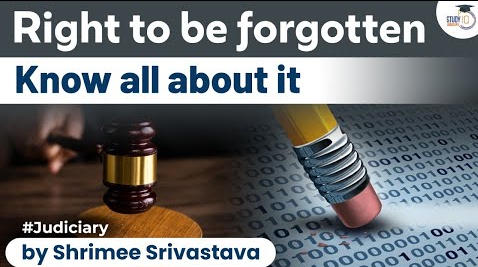Table of Contents
What is the Right to be forgotten?
- The right to be forgotten empowers individuals to ask organizations to delete their personal data.
- Justice BN Srikrishna Committee’s draft Personal Data Protection Bill 2018, has introduced a new right called the right to be forgotten in India.
- Which refers to the ability of an individual to limit, delink, delete, or correct the disclosure of personal information on the internet that is misleading, embarrassing, or irrelevant.
- Further, section 27(2) says the adjudicating officer (Data Protection Authority) can decide on the question of disclosure, and the circumstances in which he thinks such disclosure can override the freedom of speech and the citizen’s right to information.
- Right to be forgotten is in sync with the right to privacy, which was hailed by the Supreme court as an integral part of Article 21 (right to life) of the constitution in Puttaswamy judgement 2017.
- Right to be forgotten gets in conflict with the right to information.
- This can be depicted in the cases where a rape victim has a right that her past is forgotten and at the same time a criminal cannot claim that he has the right to insist that his conviction should not be referred to by the media.
- Whether the data online has to be retained (right to information) or erased (right to be forgotten) from the web, the decision has to be taken by the Data Protection Authority.
- This may turn the right to be forgotten into danger to press freedom as a journalist has to wait for the decision of the adjudicating officer.
- Thus, the freedom to criticise the public personalities for their public policies based on their past statements and activities will be in jeopardy.
- Also, a citizen seeking access to such information will be confused, whether to approach the Central Information Commission or Data Protection Authority.
- The state retains unbridled powers to collect and process data, without the need for consent, for the national interest.
- However, the national interest is nowhere defined, which allows the application of the right to be forgotten under the discretion of the government.
Why In News Right to be forgotten?
- On 17 August, A division bench of Hon’ble Justices A Muhamed Mustaque and Hon’ble Justice Sophy Thomas was considering a batch of pleas seeking erasure of the petitioners’ personal details from Google search results and Indian Kanoon.
- The Kerala High Court on Wednesday opined that the right to be forgotten may not be one that can be claimed as an absolute right especially when it comes to details of litigants which are available online on portals like Indian Kanoon.
- Justice Mustaque opined that even if a party is acquitted, information about what the case and charges were, might be required for other purposes.
- Some of the petitions were specifically against Google Inc. for erasing the search results, and Indian Kanoon for carrying court orders with the petitioners’ personal information.
- But Justice Mustaque pointed out that since there currently is no data protection law in India, it may be up to the discretion of individual online portals on what information is to be made available.
Right to be forgotten
- The petitioners in the batch of cases before the bench were mostly involved in matrimonial and custody disputes.
- Some of the pleas were moved by persons who were acquitted in criminal cases.
- One such plea was moved by a consultant dentist who was aggrieved by the fact that a bail order published on Indian Kanoon, containing his personal details, was the first result of an internet search, despite his subsequent acquittal in the case.
- Describing the experience as traumatic, especially because the search result displayed his name, father’s name, address, and a wrong crime number, the petitioner stated that the same infringes upon his right to privacy.
- Suggesting that the popular judgment database could deindex the particular bail order from the search result, the petitioner sought recognition of his right to be forgotten as a facet of the right to privacy.
- Indian Kanoon responded to the plea asserting that the right to privacy cannot be extended to protect an individual from publications based on public records, including court orders.
- It was contended that the petition sought to bypass legislative procedure underway to statutorily recognise the right to be forgotten.
- Relying on the judgments of the Supreme Court in R Rajagopal v. State of Tamil Nadu, KS Puttaswamy and Navtej Singh Johar , Indian Kanoon submitted that “the right to privacy under Article 21 cannot give rise to the claim that court records cannot be published.“
- Referring to Clause 20 of the Personal Data Protection Bill, 2019, it was argued that the plea was premature since the legislature was actively considering the viability of recognising the right to be forgotten.
- The right to privacy of an accused, or the right to be forgotten, is an issue that several constitutional courts across the country have been seized of ever since the Supreme Court, in its landmark, 2017 Puttaswamy judgment, had mentioned the right to be forgotten as a facet of the right to privacy.
Way Forward (Right to be forgotten)
- In order to implement the right to be forgotten, privacy needs to be added as a ground for reasonable restriction under Article 19 (2) by a major amendment to the Constitution.
- There must be a balance between the right to privacy and protection of personal data (as covered under Article 21 of the Indian constitution), on the one hand, and the freedom of information of internet users (under Article 19), on the other.
- A comprehensive data protection law must address these issues and minimize the conflict between the two fundamental rights that form the crucial part of the golden trinity (Art. 14,19 and 21) of the Indian constitution.
Download | Free PDF






















 WhatsApp
WhatsApp